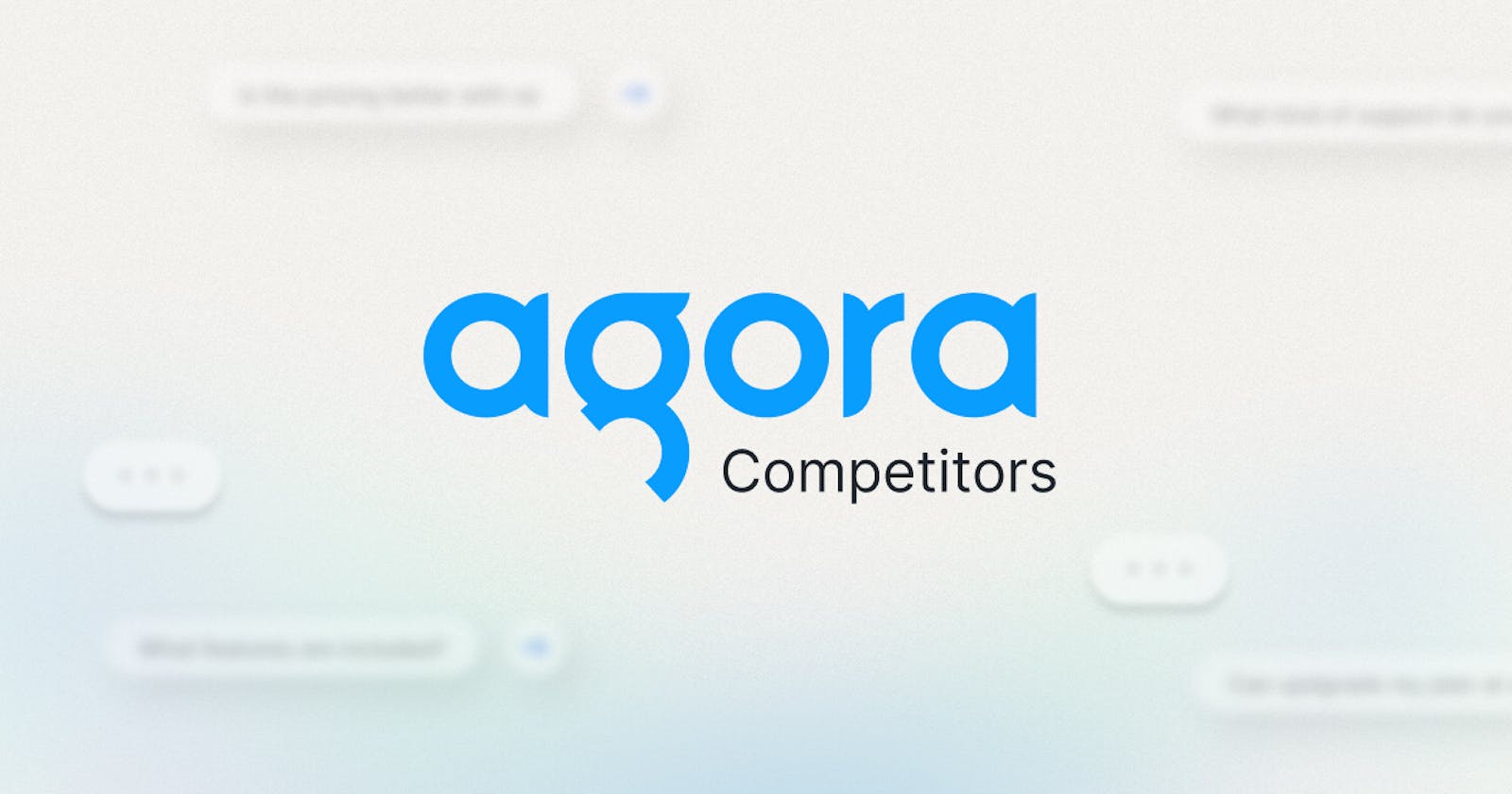Table of contents
- Agora Video Overview
- What to Consider When Deciding Between Agora and Competing Solutions
- Head-to-Head Comparison of Agora and Top Video Calling Alternatives
- Comparing Agora to the Top Live Stream API Providers
- Top Four Open-Source Agora Alternatives
- After Comparing Agora to Competing Solutions, Which Is Right For You?
Seamless real-time communication is the key to connecting people and businesses across the globe, and Agora has emerged as a powerful player in the video and audio API space.
In this comprehensive comparison, we delve into the advantages and disadvantages of Agora and its competitors for video calling, live streaming, and open-source solutions.
Whether you're a developer looking to embed video, voice, or messaging capabilities into your applications or a business searching for the perfect communication platform, this in-depth analysis will help you navigate the intricate landscape of communication APIs.
Agora Video Overview
Agora is a cloud communications platform that provides APIs and SDKs for developers to embed real-time voice, video, and messaging capabilities into their applications. It enables low-latency, scalable, and cross-platform communication, making it suitable for various applications like virtual events, online meetings, e-learning, and telehealth.
Agora offers features such as screen sharing, whiteboarding, and security measures to protect user data and communications, allowing developers to create customized, interactive applications that require real-time communication.
Advantages of Agora
Global Edge Network: Agora is one of two providers in the space to offer a global edge network; the other is Stream.
AI Noise Suppression: Agora supports AI-based noise suppression.
Extension System: Agora has an extension system that builds upon its video and voice products.
Drawbacks of Agora
Developer Experience: Agora takes significantly more time to integrate than competing solutions like Stream and 100ms, making it difficult to build a complete and stable experience.
Security and Privacy: Agora is based in China and follows local data privacy laws, leaving many potential customers concerned about privacy, security, and data integrity and the potential risk of future regulation against solutions like Agora.
Pricing: For certain use cases, Agora is significantly more expensive. The impact of that depends on how many minutes you use the solution.
Main Agora Features
Agora's API offers a rich feature set, including the following:
Ultra Low Latency and Interactive Livestreaming: Real-time live streaming is typically preferred when the audience is meant to engage with the content. If you want to build a platform like Twitch, where there is an exchange of engagement between the host and the audience, low latency is a priority. For streaming a soccer match, an additional 10-20 seconds of latency is acceptable.
HLS Live Streaming: Agora also offers a slower version of live streaming with the benefit of better buffering under poor network conditions.
Video Calling: Agora supports building video calling and Zoom-style applications.
What to Consider When Deciding Between Agora and Competing Solutions
Most video and audio APIs have seemingly endless nice-to-have feature sets. While it may seem like they have everything you need to build the perfect experience at a glance, be sure that they offer the following must-haves at a high level of proficiency:
Developer Experience: Engineering time tends to be the most expensive part of a video solution, whether it be launching, iterating, or maintaining it. It's critical that the video and audio provider you choose offers robust documentation, an easy-to-use product, and adequate customer support.
Global Edge Network: The speed of light only goes so fast. Establishing servers within close proximity to your end users lowers the risk of losing packets and makes recovery faster if there are stability issues. If a video and audio vendor has a global edge network, that means they have servers around the world to ensure the quality of video calls on your platform is high.
SDK Quality: It's easy for SDKs to have bugs—especially regarding camera access or codec support. The quality of your solution provider's SDKs can have a large impact on the stability of your end user's experience.
Privacy and Security: Video data can often be sensitive. Be sure to vet your potential provider's privacy, data, safety features, and security policies before integrating to confidently deliver a safe experience.
Chat: While it can depend on the nature of your app, for many video and audio use cases, solid chat functionality is just as important. A reliable, scalable chat experience to accompany live streams, video calls, and audio rooms that store messages have reactions, replies, typing indicators, message previews, URL previews, etc., is more than just the icing on the cake—it is a vital part of your app's overall UX.
Head-to-Head Comparison of Agora and Top Video Calling Alternatives
The competitive landscape varies from video calling to livestreaming to open-source solutions. In the section below, we'll compare Agora's video calling solution against those of the top five competitors in the space.
1. Agora vs. Stream
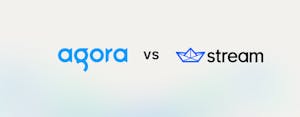
Advantages of Stream
The world-class developer experience is the biggest differentiator between Stream and Agora. You can build in-app video calling, live streaming, and audio rooms in days with Stream, compared to the more challenging integration of Agora for video calling. The gap between the two solutions is quite large because:
Stream's modern SDKs
Stream's average customer support response time of 30 minutes or less
Stream's dynascale capabilities automatically control the size and visibility of video elements and adjust codecs, resolution, fps, and bandwidth usage based on that data—which is essential for all calls, but especially those with more than 20 participants
Excellent documentation and extensive tutorial library
Automatic connection recovery
Stream's intuitive dashboard experience is much easier to use than Agora's
Here are some other advantages of Stream compared to Agora's video calling API.
Integrate a single SDK for multiple video and audio use cases like live streaming, audio rooms, and video calling, giving you ultimate flexibility to mix and match.
Compliant privacy and security laws are followed by Stream, as it is based in the EU and USA and has to follow strict local privacy and security regulations.
Advanced chat capabilities, including reactions, threads, quoted replies, URL previews, editing, deleting, moderation, and typing indicators, are far ahead of Agora.
Flexible recording options enable you to control the layout via templates, variables, and URLs.
Backstage mode gives you a convenient way to set up your call with co-hosts before opening it up to a wider group of people.
See a preview of the live stream before joining and enable views of participant counts and thumbnails.
Permission system for granting audio, video, or screen share permissions live.
Custom data on users, members, and calls for a flexible integration you can trust.
Pricing is substantially lower for Stream compared to Agora.
Agora Advantages
Agora has a rich extension system when compared to Stream. Specifically, Agora's extension support for AI-noise suppression and video backgrounds.
2. Agora vs. 100ms
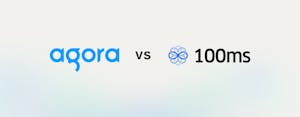
100MS Advantages
In terms of developer experience, 100MS ranks among the top three in the market, surpassing Agora by a significant margin. Both platforms have limitations in terms of chat support.
However, 100MS, much like Stream, provides a single SDK that caters to both video calling and live streaming. This streamlined approach simplifies the development process, making it easier to create diverse experiences such as all-hands meetings or audio rooms compared to Agora. Additionally, 100MS offers robust custom data support for both peer and session, enhancing flexibility and customization options for developers.
Agora Advantages Over 100ms
Agora boasts a robust extension system, notably excelling in AI noise suppression and video background support. Their infrastructure, on par with major players like Stream, spans a global edge network. In contrast, 100ms, being a smaller company, may pose vendor risk due to its size. Additionally, it's worth noting that 100ms does not support ringing calls.
3. Agora vs. Daily

Advantages of Daily
Privacy and security are critical considerations in today's digital landscape. Daily acknowledges that its platform, like Agora, is subject to China's data access laws, which may raise concerns for users regarding the potential implications for their data privacy.
Another aspect to consider is Daily's support for Cross-platform Adaptive HEVC (H.265) encoding, which can be advantageous primarily for users engaged in iOS to iOS calls, as it may not be as compatible or efficient when participants join from web browsers or Android devices. On a more positive note, Daily excels in the realm of programmable HD compositing, offering excellent recording options for users.
However, the claim of a peer-to-peer media routing mode as an advantage should be approached with caution, as in most scenarios, connecting peer-to-peer can lead to a suboptimal user experience. This approach differs from popular solutions like Zoom and Google Meet, which prioritize centralized routing for better performance.
Daily, much like Stream, offers automatic discounts at higher usage tiers, while Agora follows a more enterprise-oriented sales approach. These factors should be carefully weighed when choosing the right platform for your specific needs, taking into account your priorities regarding privacy, functionality, and user experience.
Agora Advantages Over Daily
Agora has an extensive extension system, notably featuring support for AI noise suppression and customizable video backgrounds. However, Daily appears to lack support for ringing calls. There have been customer reports indicating that the process of joining and transitioning between calls on the Daily platform may suffer from slower speeds, which is an important consideration when evaluating these communication tools.
4. Agora vs. Jitsi 8X8

Jitsi 8X8 Advantages
Jitsi 8x8 is usable without much development work. It's closer to Zoom in some ways than Agora, which can be seen as an advantage or a problem, depending on your use case.
Agora Advantages Over Jitsi 8X8
When it comes to pricing, Agora offers a more appealing structure as it charges on a per-minute basis, in contrast to the per-user approach employed by 8x8. Additionally, Agora stands out for its superior customizability compared to Jitsi. Many users have found themselves drawn to Agora due to its flexibility and customization options, while the limitations in this regard, along with pricing concerns, have often been the driving factors for individuals considering a switch away from Jitsi.
5. Agora vs. Vonage

Vonage Advantages
Vonage supports video well, but they do not specialize in it. The company's product offerings are extensive. So, if you're in the market for SMS and other communication and customer engagement solutions, bundling video with them can make sense.
Advantages of Agora Over Vonage
The video SDKs for Vonage are quite outdated. In general, the developer experience on both of these products is very poor compared to 100MS or Stream.
Comparing Agora to the Top Live Stream API Providers
When building a live streaming app, there are specific features you will need versus an on-demand streaming app, video conferencing platform, or audio room solution. Evaluate the four Agora alternatives below to see which one is the right fit for your live stream app.
1. Agora vs. Stream

Advantages of Stream
As mentioned above, the seamless developer experience is the biggest differentiator between Stream and Agora. Stream offers a swift and user-friendly solution for integrating in-app video calling, live streaming, and audio rooms, taking just days to set up. This contrasts with the more intricate process of integrating Agora for live streaming.
Key distinctions between the two include Stream's modern live streaming SDKs, rapid customer support, dynamic scaling capabilities, excellent documentation, and an intuitive dashboard. Stream also outshines Agora in various aspects:
Stream provides a single SDK for multiple styles of video and audio applications, ensuring flexibility for various use cases. It complies with privacy and security regulations, boasts advanced chat features, flexible recording options, backstage mode for call setup, and even lower pricing than Agora. Stream offers a comprehensive package for seamless, efficient, and cost-effective multimedia integration.
Agora Advantages
Agora also supports RTMP Out for easy exports to YouTube, other streaming platforms, etc. This is currently not supported by Stream, but it is on the company's product roadmap for 2024. Both solutions provide many of the core features you need to build a world-class live streaming solution with interactive real-time live streaming, HLS (higher latency), and RTMP input.
2. Agora vs. Mux
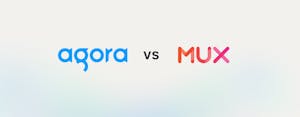
Mux Advantages
The dashboard in Mux is one of the best on the market. Similar to Stream, it makes it super easy to take your RTMP video feed and broadcast it to the world. Mux is US-based, so US-based apps might be more familiar and aligned with the local privacy and security regulations Mux follows.
Advantages of Agora Over Mux
Mux raised at a very high valuation. Today, the company does not have adequate revenue to support its past valuation. This means there is some financial and business continuity risk when choosing Mux.
Agora supports both HLS and WebRTC-based live streaming protocols. Whereas Mux seems to focus primarily on HLS-based live streaming, which has better buffering but greater latency, which makes it less suitable for streams that encourage audience interaction.
3. Agora vs. Amazon Interactive Video Service (AWS IVS)

AWS IVS Advantages
Using AWS IVS means you can use your AWS credits. This can be a major advantage, as well as cost-effective, as AWS is cheaper when it comes to pricing.
Agora Advantages
AWS has limitations regarding the max video resolution, the number of live stream participants, and co-hosts due to its WebRTC-based stream. The developer experience for Agora is more straightforward than that of AWS.
4. Agora vs. MilliCast (Dolby.io) & PhenixRTS
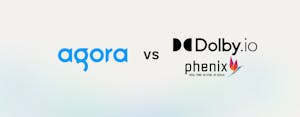
Advantages of MilliCast and PhenixRTS
MilliCast (now owned by Dolby.io) and PhenixRTS target the upper end of the live streaming market. Because of this, they support less common ingest options. PhenixRTS supports SRT, SDI, MPEG-TS, and RTSP over UD, and Millicast supports WHIP, RTSP, RTMP, SRT, and NDI.
Agora Advantages
In general, Agora has a better developer experience compared to MilliCast and PhenixRTS. You can use Agora for both livestreaming and video calling, too, which is an advantage for many apps' multi-media use cases.
Top Four Open-Source Agora Alternatives
There are several open-source alternatives to Agora. When considering other open-source solutions, it's important to review possible WebRTC architectures. There are a few different approaches:
Global Edge Network with SFU cascading is optimal for low latency and call reliability. It's the approach solutions like Google Meet, Zoom, and live stream providers like Millicast, Stream, and PhenixRTS take.
Peer-to-Peer connections, which do not require a server, just using WebRTC is enough.
Single SFU or cluster of SFUs, which makes it harder to achieve low latency, scalability, and high stability.
1. WebRTC Peer-to-Peer

The most common free, open-source solution for video calling is WebRTC in peer-to-peer mode.
Pros:
Cons:
Unable to scale beyond 3-4 participants.
High call latency, low quality, and poor stability.
Integrating WebRTC can be time-consuming and increase the risk of errors, especially on the web.
Certain features can't be implemented or are made more difficult to engineer like recording.
Potential privacy issues and security vulnerabilities due to direct peer-to-peer connection.
2. Livekit
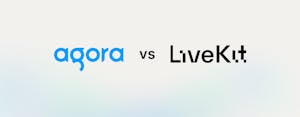
Livekit is a new open-source SFU. It's based on the popular Pion Go framework that Stream and several other providers use.
Pros:
Open-source
Can scale to larger calls.
Cons:
You need to host and maintain your own infrastructure, which can be expensive and time-consuming.
Bandwidth can be very expensive with some of the top cloud hosting providers.
For an optimal user experience, you want to run hundreds of Livekit instances, but doing so isn't very practical for most apps.
Developer experience isn't as polished as 100MS or Stream.
Recording capabilities are not as easy to use as Daily.
3. Mediasoup
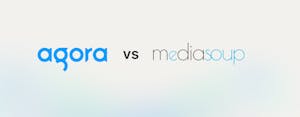
Mediasoup is an older open-source solution and offers bindings in Rust and JS.
Pros:
Open-source
Can scale to larger calls.
Sender and receiver bandwidth estimation with spatial and temporal layers distribution algorithm.
Cons:
You need to host and maintain your own infrastructure.
Bandwidth can be very expensive with some of the top cloud hosting providers.
Developer experience isn't as polished as other Agora alternatives
Recording capabilities are not as intuitive as Daily
4. Ant Media

Ant Media is a smaller open-source SFU that caters to live streaming customers. Similar to Stream, Millicast, and PhenixRTS, it offers WebRTC-based live streaming with low latency (500ms).
Pros:
The source is available on GitHub, but the license isn't clear.
Focused on live streaming.
Cons:
- The project seems smaller than MediaSoup and Livekit.
After Comparing Agora to Competing Solutions, Which Is Right For You?
The world of real-time communication solutions is teeming with options, each catering to diverse needs and priorities. Agora stands as a formidable contender with its cloud communications platform, offering a rich set of features, including low-latency live streaming, video calling, and an extension system that fosters innovation.
However, our in-depth comparison has unveiled a competitive landscape where alternatives specialize in critical areas, like:
Developer Experience and Edge Network: Stream is ahead of the competition when it comes to its ease of integration and Global Edge Network infrastructure that supplies servers around the world. If your app needs a reliable, seamless video and audio integration with superior reliability, Stream is your best option.
Recording Capabilities: If video and audio recording is a top feature on your list and you need an easy-to-use interface for setting it up, Daily is a great option. While other platforms have recording functionalities, Daily's is the best.
Vendor Viability: AWS IVS is the largest company in this space. To our knowledge, AWS has never removed a product. So, from a business continuity standpoint, AWS is certainly a safe option.
Whiteboard, AI Noise, and Video Filters: The extension system in Agora is ahead of all of the other vendors listed here. So, if that's what is most important to you, Agora will suit your use case.
The choice between Agora and its competitors ultimately hinges on your app's unique requirements. Are you seeking a developer-friendly solution, rock-solid infrastructure, or advanced features like whiteboard and AI enhancements?
Whatever your priorities, this comprehensive analysis is your compass in navigating the dynamic world of communication APIs. As you embark on your journey to select the perfect real-time communication partner, consider the factors that matter most to you and your application and make an informed decision that aligns with your vision.
Whether it's Agora, Stream, Daily, AWS IVS, or any other contender, the right choice awaits, empowering you to connect, engage, and innovate in today's interconnected digital landscape.
